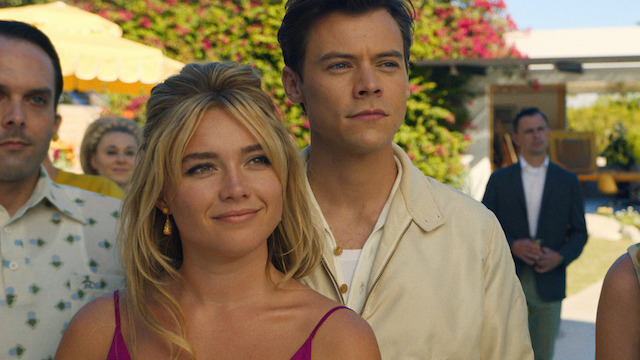Movies & TV / Reviews
Don’t Worry Darling Review
 Image Credit: Warner Bros. Pictures
Image Credit: Warner Bros. Pictures

Directed By: Olivia Wilde
Written By: Katie Silberman, Carey Van Dyke, and Shane Van Dyke
Runtime: 123 minutes
MPAA Rating: Rated R for sexuality, violent content and language
Florence Pugh – Alice Chambers
Harry Styles – Jack Chambers
Chris Pine – Frank
Olivia Wilde – Bunny
Gemma Chan – Shelley
Nick Kroll – Dean
Kate Berlant – Peg
KiKi Layne – Margaret
Douglas Smith – Bill
Sydney Chandler – Violet
Asif Ali – Peter
Timothy Simons – Dr. Collins
Olivia Wilde follows up her acclaimed, coming-of-age story, Booksmart, with her sophomore directorial effort, Don’t Worry Darling. The drama leading up to the release of Don’t Worry Darling sounds like it would be worthy of its own motion picture. Putting that aside, Wilde swings for some big ideas and topical, interesting themes with Don’t Worry Darling. While the film does excel in a few areas, it loses sight of the goal and runs out of steam about midway through.
Young married couple Alice (Pugh) and Jack Chambers (Styles) appear blissfully in love and happy after moving into their idyllic, suburban 1950s neighborhood. During the day, Jack and the town’s neighbors work at a top-secret headquarters for an enigmatic organization called the Victory Project. At night, Alice and Jack party with their friends, spend some romantic time alone, or both.
During the day, while the husbands are away at work, Alice spends time cleaning the house, shopping, or training in ballet with the other wives under the tutelage of their strict instructor, Shelley (Chan). Shelley is also the wife of the Victory Project’s enigmatic figurehead, Frank (Pine). However, something is not right in this seemingly utopian paradise. After one of Alice’s other friends and neighbors, Margaret (Layne), starts asking questions about where they live, strange things begin to occur. Alice constantly sees subliminal imagery, and bizarre phenomena start to take place.
The Victory Project’s boss, Frank, is quite a suspicious character who speaks of the dangers and chaos of the outside world, espousing the virtues of organization and control. He is undoubtedly charismatic but preaches a sermon similar to a cult leader. Alice eventually realizes something is very wrong with the place she calls home and must find a way to escape.
Don’t Worry Darling excels in some of its technical areas, as Wilde employs a top-notch production staff. Matthew Libatique wondrously showcases the 1950s style and aesthetic of the era. Katie Byron initially captures the era in a way that makes it seem pleasant, serene, and docile, yet with the feeling that something sinister is underneath. Together these elements make the film’s setting look authentic, yet oppressive. When the cracks in the town’s veneer emerge, it becomes suffocating. Wilde, along with her production crew, executes the town’s overpowering, lugubrious undertone well.
Florence Pugh displays her chops as the beleaguered Alice. She endures excessive hardship, putting her through an emotional wringer, despite how much she appears to love her husband. Unfortunately, Styles fails to match Pugh’s energy onscreen, and it shows. His performance is flat and deeply unconvincing, which is a problem when so much of the film hinges on Alice and Jack’s relationship.
Pine fares better as the Victory Project’s cultish, charismatic leader, but his role is far too underutilized. He is positioned as Alice’s chief antagonist, but there is never a satisfying payoff. The script begins to fall apart midway through, and the major plot twists and reveals are utterly underwhelming.
Don’t Worry Darling is problematic in that early on, the town is shown to be rotten and crooked. The film keeps dangling the carrot of the truth for far too long. Whatever the audience guesses or predicts regarding the truth behind the town is likely correct. By the time the reveals finally happen, the movie is nearly over and rushes to an abrupt finale. A bevy of plot twists is not given proper time to marinate. Their vast implications are never adequately addressed.
The uneven pacing of the film is another major mark against it. About midway through the film, Don’t Worry Darling begins to grow highly repetitious, as certain scenes unfold similarly with little narrative headway. The plot’s repetitive nature does not help, as what amounts to a two-hour movie plays more like a three-hour one. John Powell is generally a strong film composer, but his more minimalist score, with its odd tones sounds grating and irritating on the ears, rather than intriguing and mysterious.
Without giving too much away, some interesting ideas are at the heart of Don’t Worry Darling, specifically in how it deconstructs the idyllic, nostalgic ’50s era and the plight of the American suburban housewife. However, Katie Silberman’s script does not handle the grander ideas in a fresh, unique, or interesting way. The movie ends with a disappointing thud.









